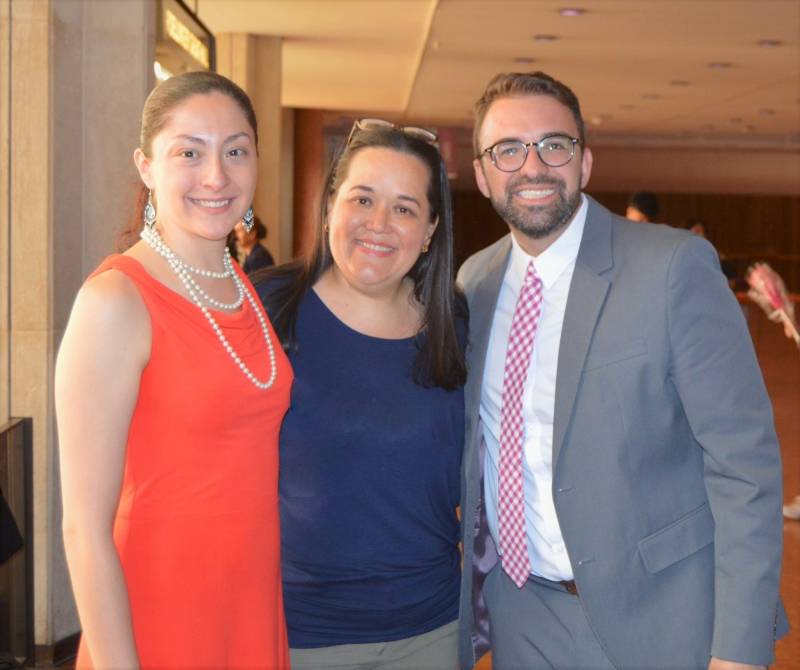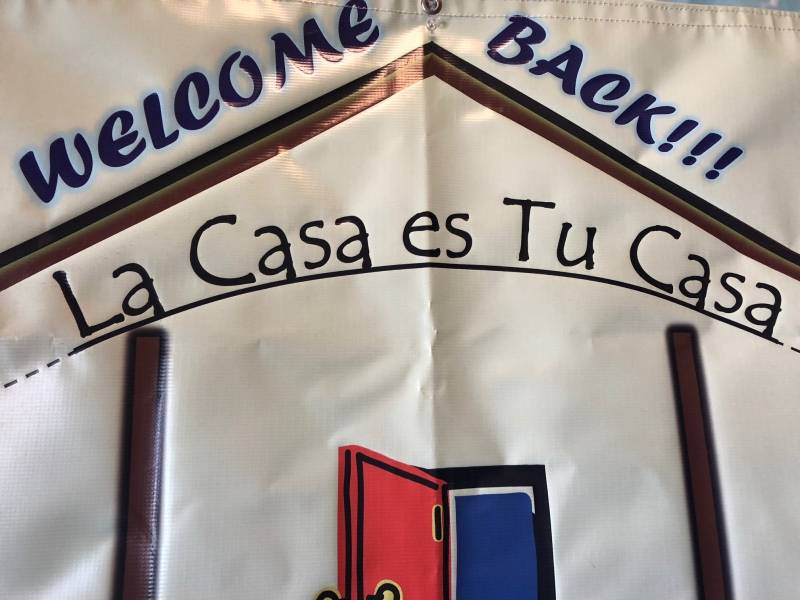As the director of La Casa Cultural Latina at the University of Illinois, Dr. Gioconda “Gio” Guerra Perez is all about education–students, families, faculty. She grew up in a small town in Panama, attending the local Catholic school through 12th grade. Her mother, at 75, has been teaching for more than 50 years. Fifty years. It’s no surprise, then, that Dr. Perez has spent her entire career dedicated to education, specifically helping to smooth the way for immigrant students and their families, as they navigate public school and higher education systems that is fraught with barriers to their success. She’s pretty great at it too, having recently been honored with both the Chancellor’s Academic Professional Excellence Award and the Leadership Award for Advocacy from the University YWCA.
Dr. Perez pursued higher education in both Panama and the U.S., and obtained her PhD in Educational Organization and Leadership from the University of Louisville after being encouraged by her husband. “He said ‘if you want to do what you want to do — I wanted to change the world– you need to get a PhD.’ It’s harder for women to get recognized in many instances, and even if you have the highest degree you can get, you still have to work harder sometimes to be recognized.” With her whole family still living in Panama, Dr. Perez never thought that she’d end up settling here, but that decision has resulted in innumerable students and their families receiving her guidance in the world of public education.
Through the New Neighbors program at Indiana University Southeast, Dr. Perez trained ESL teachers and student teachers on how best to serve the area’s growing immigrant population. “We had a specific mission,” says Dr. Perez, “I was a social-cultural specialist working with the schools, working with the teachers and college students who were getting their ESL endorsement and I realized that we were missing one component, to make the program effective, which was adding the parent component. I was working with immigrant families, and educating them about K-12 [education] and how to navigate a system where you don’t have the language skills to connect with the schools.”
Through that work, she became aware of the disconnect many immigrant families had with the concept of higher education. She was seeing “so many bright students not being able to attend even a two year or technical college because they had no clue how to go about it, no funding.” Most would be first generation college students, and many were immigrants themselves, having come to the U.S. as young children. They were experiencing barriers that Dr. Perez herself had not faced in her personal journey. “I always felt that I fit. I didn’t have the experience of being a minority. It took me awhile to understand the culture here, how different it was. Why there was such a mystery about going to college. I understood that I had a very different experience, that I cannot put myself in the shoes of other Latinos because I grew up in a different country, a different environment, a different culture. I had to understand the culture and environment and the barriers in this particular context.”
 Dr. Perez (center) with La Casa assistant directors Araceli Diaz and Jorge Mena. Photo from La Casa Facebook page.
Dr. Perez (center) with La Casa assistant directors Araceli Diaz and Jorge Mena. Photo from La Casa Facebook page.
Having seen the obstacles that some Latinx students have faced in just getting to college, La Casa seems a natural place for Dr. Perez to continue her quest to educate, support, and advocate. The center, founded in 1974, has a mission “to promote a welcoming and dynamic atmosphere through the development of educational, cultural, socio-political, and social programs that lead to greater recruitment, retention, advancement, and empowerment of Latina/o students.” Dr. Perez, with the help of faithful assistant directors and student leaders, works to create programs that not only educate Latinx students, but encourage them to take ownership of their experiences. “I do work with students who are battling their own identity as Latino, as Latina, as Latinx, in STEM, in business,” says Dr. Perez, “and I think that a lot of our students have been sheltered or have only been part of one particular community, a community in which they have felt comfortable. Then when they come here it’s a different world. Some of the programs that we have created is to allow the students to do some of these explorations outside of La Casa. The center is here for us to educate our students and the larger community. It is here to create spaces and programs where students take the lead, and we are here to guide them and help them to navigate an institution. Because once they get out of here they’re going to have to do the same. All of our programs are student led now. They are creating committees, creating alliances, creating networks, and getting out of their comfort zones and planning programs to be visible in the community.” Some of these programs include META (mentoring, encouraging, teaching, achieving), Lunch @ La Casa, and the Black and Latino Male Summit and Black and Latina Womxn Summit.
La Casa has expanded its reach across campus, as they’ve welcomed and supported undocumented students, regardless of their country of origin. Though the national news has thrust the “issue” of undocumented immigrants and DACA recipients into our collective consciousness, Dr. Perez emphasizes that the issue is not new. When she arrived on campus in 2013, DACA had been in place for just over a year, and there was not much knowledge about it. As she remembered, “I met the first DACA student eight days after I started here. She was sitting here with her parents and siblings. She’d gone to an office on campus and they had no clue how to help. The staff was not trained. We took on educating those who would be specifically working with them: guidance counselors, admissions counselors, the financial aid office.” We also have to remember that DACA and undocumented students have issues like any other students. As Dr. Perez states, “being undocumented is not their only identity. There are some students who are more concerned with academics than their immigration status. I understand that. They are more concerned with’ how am I going to pay for this semester’ than ‘am I going to get renewed.’” in addition to training modules developed by La Casa, undocumented students and really anyone who wants to learn more can go to the Open Illinois website, which was recently developed as a resource to inform on DACA and other legislation and how to support those students affected.
Dr. Perez acknowledges the misconceptions that Latinx students often have to face, “I haven’t doubted my identity. I grew up in Latin America. I wasn’t going to let anybody discriminate against me. They grew up always hearing ‘you are a minority’.” Many assume that immigrants from Latin America are here because things are bad in their home countries, or that they are wanting to take advantage: receive welfare, federal help, etc. That notion is misguided at best, when you take into consideration the restrictions that DACA recipients and undocumented students are under. Many of those resources are not even available to them. The other big misconception is that that all who come here from Latin countries are the same: eat the same foods, have the same cultural traditions. Even if her students come from different parts of the state of Illinois, they are coming in with different cultural experiences. Yet many times students that are 3rd and 4th generation are still seen as foreigners by others.

Dr. Perez does not have a problem with educating others about how to navigate cultural conversations, in fact she sees that as one of the roles of La Casa, to raise the consciousness of others, particularly on campus. But she emphasizes that it is not student’s responsibility to do the educating as individuals. Dr. Perez is looking to create more campus wide initiatives, and spark those conversations that might be difficult but necessary. She’s has been involved in overseeing the development of the U.S. Minority Cultures course that will be a part of the curriculum for incoming students beginning this fall, a welcome addition to course requirements given the threads of divisiveness and racism that persist on campus. As Dr. Perez states, “sometimes you have learned a few things, that then you have to unlearn.”
In this era of heightened divisiveness, not just on campus but nationwide, Dr. Perez maintains an attitude of persistence: “There are a lot of things out there that we cannot control, but we can not be distracted and we need to move forward. We are trying to do that work.”
La Casa Cultural Latina is located at 1203 W. Nevada in Urbana. You can learn more about their mission and programming by visiting their website.
Photos of La Casa by Julie McClure.








